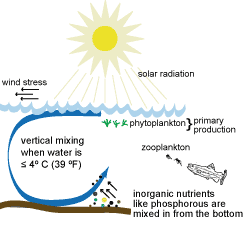|
Water Ecology of the Great Lakes Climate change may result in changes in lake temperatures which could affect fish communities as well as commercial and recreational fishing. Changes in the lakes temperatures may alter the food web make-up of lake algae; new exotic species may pose challenges for fishery managers and water utilities, as they try to provide safe, clean water to their communities. Results of assessment findings suggests that primary production in Lake Michigan will decline as the climate warms, which has implications for the entire food web supporting fish life. All other factors being equal, fish from all thermal guilds would benefit from climate change because of increases in the length of the growing season and because fish can move to deeper, cooler waters when surface waters exceed preferred temperatures. However, changes in deep-water oxygen and other habitat variables may prevent the more vulnerable cold-water fish from occupying their current, preferred thermal niches. Impacts on the Great Lakes are further complicated by the introduction of exotic species such as the zebra mussel, alewife, sea lamprey as well as unknown invaders of the future. Great Lakes Regional Summary Report —Water Ecology (PDF) |
|
Heartland Rivers: A Regional Analysis of the Potential Effects of Climate Change
The flow from the streams and rivers that feed into the lakes will also likely change. Inland rivers in the Great Lakes region that are primarily snowmelt driven (e.g., peak flows in early spring) may have earlier peaks as a result of less snow and more rain. Changes in summer flows for all rivers will likely depend on how the future increased precipitation that is suggested by the GCM simulations is balanced by evapotranspiration within watersheds. Great Lakes Regional Summary Report —Rivers (PDF)
